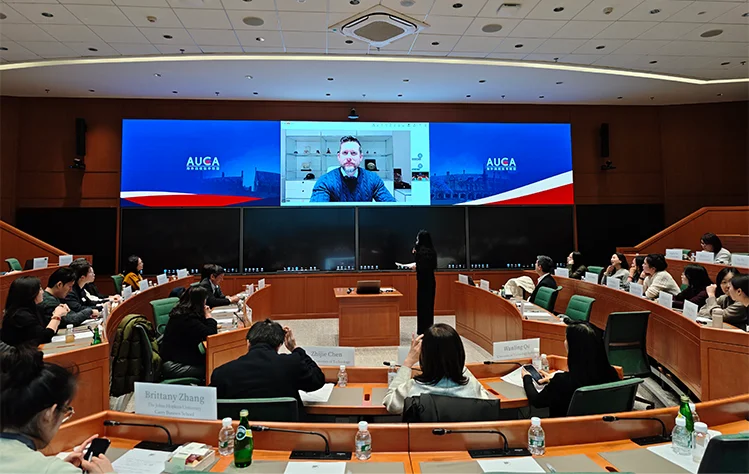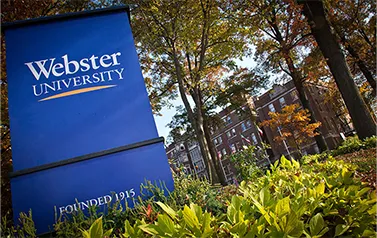The study of psychology can be extremely useful for a variety of situations, whether you plan to pursue higher studies and eventual research or try your hand at a corporate career. Here, the emphasis is not just on concepts and theories. We also ensure that students become well-versed in the practical aspects, by understanding and applying this delicate area of study to real-life scenarios.
Two Degree Options
Bachelor of Arts (BA) in Psychology
The BA in Psychology offered at Webster is designed to build a strong foundation of understanding, interpreting, analyzing and applying the study of psychology in different contexts.
In this program, students get to develop a superior and more in-depth understanding of the complexities and diversity of human behavior and behavioral patterns. Students also get to learn about theories and concepts of psychology behind most of these behavioral elements. The program uses both scientific approach and philosophical approach towards understanding psychology. Both theoretical concepts, and experimental data are taken into account during the study. Students are also encouraged to develop and apply problem-solving aptitude, and clear communication, as an aid to expand their knowledge horizons.
BA in Psychology with an Emphasis in Mental Health
The Bachelor of Arts in Psychology with an Emphasis in Mental Health is designed to proved an understanding of how cognitive, behavioral, personality and social factors are involved in mental health and illness. Students who have successfully completed the degree will be prepared to pursue a variety of graduate and career opportunities within mental health-oriented fields (e.g., counseling, nursing, psychology, social work).
Students graduating with a BA in Psychology with an Emphasis in Mental Health will need to pursue a graduate degree before they are able to obtain professional licensure. Students are encouraged to check entrance requirements for any post-graduate programs prior to finishing their BA at Webster in the event they need to take additional coursework.
Program Details
After completing our undergraduate degree in psychology, students will be able to:
- Understand, describe and explain in detail the various attributes of psychology, such as concepts, theories, perspectives, trends and empirical findings.
- Apply analysis and research methodologies toward the field of psychology. They will do so by building skills in key areas like controlled research design, analysis, and interpretation of data.
- Internalize and implement skills such as critical thinking, creativity, and questioning theories and behaviors. They will also know about the scientific approach towards problem-solving within psychology.
- Understand and discuss in detail a number of phenomena like diversity, inequality, individuality and multiculturalism in a relevant and positive manner. This will be applicable both to their own countries and in an international context.
- Apply psychological understanding, principles, and education, to their own fields of work. This will be carried out while approaching personal, social, or organization-wide issues.
The 39 credit hours required for the Bachelor of Arts in Psychology include the following:
- PSYC 1100 Introduction to Psychology (3 hours)
- PSYC 1800 Careers in Psychology (1 hour)
- PSYC 2750 Introduction to Measurement and Statistics (3 hours)
- PSYC 2825 Introduction to Research Methods (3 hours)
- PSYC 2975 Sophomore Assessment (0 hours)
- PSYC 3025 Psychology and Ethics (2 hours)
- PSYC 4925 Senior Capstone: History, Philosophy, and Systems of Psychology (3 hours)
- PSYC 4950 Senior Assessment (0 hour)
- Psychology electives (at least 3 hours at the 4000-level) (9 hours)
At least ONE course from EACH of the following five content areas:
- Biological Perspectives
- PSYC 3850 Sensation and Perception (3 hours)
- PSYC 4300 Health Psychology (3 hours)
- PSYC 4550 Drug and Chemical Dependency (3 hours)
- PSYC 4650 Biopsychology (3 hours)
- Clinical and Counseling Perspectives
- PSYC 3125 Abnormal Psychology (3 hours)
- PSYC 3775 Personality Theory (3 hours)
- PSYC 3900 Introduction to Counseling (3 hours)
- PSYC 4225 Introduction to the Helping Professions (3 hours)
- Lifespan Development Perspectives
- PSYC 2200 Child Psychology (3 hours)
- PSYC 2250 Adolescent Psychology (3 hours)
- PSYC 2300 Lifespan Development (3 hours)
- PSYC 2950 Psychology of Adulthood and Aging (3 hours)
- Learning and Cognitive Perspectives
- PSYC 3325 Applied Learning Theory (3 hours)
- PSYC 3350 Cognitive Psychology (3 hours)
- PSYC 3525 Memory (3 hours)
- PSYC 3725 Psychology of Judgment and Decision Making (3 hours)
- Social and Cross-Cultural Perspectives
- PSYC 3475 International Psychology (3 hours)
- PSYC 3575 Industrial/Organizational Psychology (3 hours)
- PSYC 3600 Social Psychology (3 hours)
- PSYC 3625 Motivation and Emotion (3 hours)
Recommended Courses
- PSYC 4425 Community Practicum (3 hours)
- PSYC 4825 Senior Thesis (3 hours)
Upon completion of the Bachelor of Arts in Psychology with an Emphasis in Mental Health program, students will be able to:
- Describe the major concepts, theoretical perspectives, empirical findings and historical trends in psychology.
- Implement the use of scientific reasoning to interpret psychological phenomena and demonstrate the ability to interpret, design and conduct basic psychological research using statistical analyses.
- Apply ethical standards to evaluate psychological science and practice and apply those standards to build and enhance interpersonal relationships locally and globally.
- Demonstrate effective writing, exhibit effective presentation skills and interact effectively with others.
- Discuss the occupational pursuits available in a variety of settings given their psychological knowledge, skills and values.
- Discuss the psychological and behavioral processes in mental health and illness.
The 48 credit hours required for the Bachelor of Arts in Psychology with an Emphasis in Mental Health include the following:
- PSYC 1100 Introduction to Psychology (3 hours)
- PSYC 1800 Careers in Psychology (1 hour)
- PSYC 2300 Lifespan Development (3 hours) or PSYC 2200 Child Psychology (3 hours) or PSYC 2250 Adolescent Psychology (3 hours) or PSYC 2950 Psychology of Adulthood and Aging (3 hours)
- PSYC 2750 Introduction to Measurement and Statistics (3 hours)
- PSYC 2825 Introduction to Research Methods (3 hours)
- PSYC 2975 Sophomore Assessment (0 hours)
- PSYC 3125 Abnormal Psychology (3 hours)
- PSYC 3325 Applied Learning Theory (3 hours) or PSYC 3350 Cognitive Psychology (3 hours)
- PSYC 3025 Psychology and Ethics (2 hours)
- PSYC 3600 Social Psychology (3 hours)
- PSYC 3775 Personality Theory (3 hours)
- PSYC 3900 Introduction to Counseling (3 hours) or PSYC 4225 Introduction to the Helping Professions (3 hours)
- PSYC 4650 Biopsychology (3 hours)
- PSYC 4925 Senior Capstone: History, Philosophy, and Systems of Psychology (3 hours)
- PSYC 4950 Senior Assessment (0 hour)
- Psychology electives (at least 3 credit hours at the 4000level) (6 hours)
A least TWO courses from the following:
- PSYC 3150 Positive Psychology (3 hours)
- PSYC 3175 Community Psychology (3 hours)
- PSYC 4300 Health Psychology (3 hours)
- PSYC 4400 Human Sexuality (3 hours)
- PSYC 4550 Drug and Chemical Dependency (3 hours)
- PSYC 4700 Psychological Tests and Measurements (3 hours)
Recommended Courses
- PSYC 4425 Community Practicum (3 hours)
- PSYC 4825 Senior Thesis (3 hours)
This program is accredited by the Higher Learning Commission (HLC) in the United States. We have been accredited by the HLC for more than 95 years. This program is not Dutch accredited and does not lead to a degree based on Dutch law, Wet op het Hoger Onderwijs (Law on Higher Education).
Career Prospects
Completing an undergraduate degree in psychology equips you to add value in multiple industries. It also helps to broaden your scope of skills for suitable employment. While there are excellent opportunities in the field of Human Resources management and training, you can also find rewarding career opportunities in other fields. These include education, teaching, public affairs, social services, and mental health facilities. Apart from these, your education in psychology also greatly improves your appeal as an employee in other core industry areas. This is driven by a better understanding, communication, reading, writing, and analytical skills during the course of your study. Last, but certainly not the least, you can also opt to pursue further studies in the field of psychology and eventually get into research or teaching at a post-graduate level.
With so many exciting options and for a subject so delicate and comprehensive, our undergraduate course in psychology can be a great option for both, people who just want to gain knowledge, or those working towards a successful career.

Become a Gorlok

Whether you’re seeking an undergraduate or graduate degree, we'll help you achieve academic excellence preparing you for future career successes. The first step is to fill out our application.
Highlights from the Netherlands

Internationalization of Higher Education: Practices and Challenges of ‘Going Global’
February 5, 2026

Webster University and Arcadia Abroad Partner to Expand Study Abroad Opportunities
January 21, 2026
Global Student Leadership Summit Empowers Students to Lead Across Borders
May 27, 2025
From May 18 to 23, a group of 23 undergraduate student leaders from across the Webster global network gathered at the...
